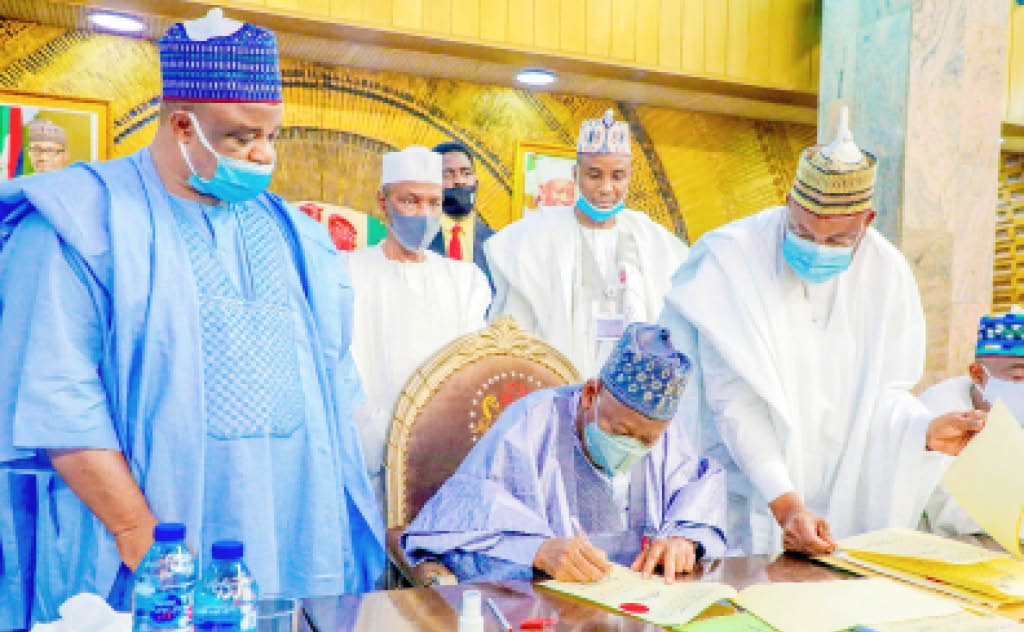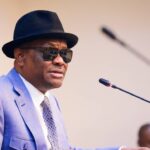The 36 states of the federation have pegged N8.272 trillion for spending in 2021, just as 22 of them have raised their budgets by N1.3 trillion, while 14 cut theirs by N1.4 trillion, an analysis of the records have shown.
The N8.3 trillion budgeted by the states is about N5.316 trillion lower than the N13.588 trillion budget of the Federal Government assented to by President Muhammadu Buhari on Thursday.
The states’ budget figure also represents 61 percent of the federal budget figure, Daily Trust reports.
Twenty states, representing 56 percent, have signed their budgets into law, while 16 others or 44 percent were yet to do so as of Wednesday.
A further analysis shows that whereas the federal budget of 2021 was raised by N505 billion from N13.082 trillion to N13.588 trillion, 14 cut down their budget figures by N1.4 trillion.

According to the records, the N8.2 trillion states’ budget is just N99bn higher than the N8.173 trillion revised 2020 states’ budget. Just like the Federal Government, the states revised their 2020 budgets due to the COVID-19 pandemic which affected their revenue projections.
However, experts have expressed concern about how the governors would finance the budgets considering low Internally Generated Revenue (IGR) and the dwindling fortune at the centre as the world battles the second wave of COVID-19.
22 states raise budgets
The analysis of the 2021 budget shows that 22 states increased their estimates, while 14 others cut down their budget figures. The 22 states had proposed N4.27 trillion but raised it by N1.314 trillion to N5.584.7 trillion during the budget defence processes.
According to the breakdown, four states in the South-West – Ekiti, Oyo, Ondo and Lagos – initially proposed N1.363 trillion but jerked it up to N1.695 trillion, representing a N332.6 billion increase.
In the South-South, three states – Delta, Rivers and Bayelsa – jerked their budgets from N821 billion to N1.222 trillion; raising them by N301.6 billion.
Anambra and Imo in the South-East had proposed N240 billion, but raised their budgets to N490.1 billion; this is at least a N250.1 billion raise in the projected spending by the two states in 2021.
In the North-West, six states increased their budgets from N1.024 trillion to N1.212 trillion. Jigawa, Kebbi, Kano, Sokoto, Kaduna and Katsina had their combined budget increased by at least N187.4 billion, the analysis indicates.

Three states in the North-East – Bauchi, Borno and Yobe – had proposed N358 billion, but raised the budgets by N170.6 billion. These states now have a combined budget of N528.6 billion for 2021.
Four out of the six North-Central states also increased their budgets from N464 billion to 536.4 billion, which is a N72.4 billion raise in the expected spending. These states are Benue, Niger, Nasarawa and Plateau.
In 14 states, spending drops
Contrary to the increase in the budgets of 22 states, 14 others across the six geopolitical zones have cut their spending estimates by N1.479 trillion. These states had proposed N4.009 trillion, but cut the estimates to N2.531 trillion; indicating a N1.47 trillion drop.
Further analysis shows that Osun and Ogun in the South-West began with N648 billion, but trimmed the budgets to N448 billion.
Three states in the South-South proposed N1.877 trillion, but slashed it to N866.7 billion, losing out N1.010tr.
The ambitious N1.1 trillion budget of Cross River State was reduced by N866.7 billion to just N277.7 billion. The other two states are Akwa Ibom and Edo.
In the South-East, Abia, Ebonyi and Enugu had a N437 billion combined budget but slightly dropped it to N424.4 billion. The cut is a paltry N12.6 billion.
Zamfara is the only North-West state that cut its budget. It had proposed N182 billion but dropped the figure to N142.7 billion; a difference of N39.3 billion.
Kogi and Kwara in the North-Central proposed N338 billion, but cut the budget by N84.5 billion to N253.5 billion.
In the North-East, the budget of N527 billion was for Adamawa, Gombe and Taraba states. However, this was dropped to N395 billion; a reduction of N132 billion.
How states fared on submission, passage
In terms of fiscal discipline, the analysis reveals that all the states submitted their 2021 budget estimates to the state assemblies; a situation that is more favourable than when they submitted the 2020 budget in 2019.
Another positive indicator is that 20 of the states have had their budget estimates passed by their houses of assembly and their governors have signed the estimates into law as the 2021 Appropriation Act.
The states that have passed and signed their budgets include Adamawa, Akwa Ibom, Delta, Jigawa, Katsina, Kano, and Kaduna.
Others are Kebbi, Niger, Sokoto, Osun and Ebonyi. The rest are Zamfara, Ekiti, Yobe, Nasarawa, Abia, Enugu, Ogun and Bauchi.
However, there are 16 states that are yet to sign their budgets into law. In the meantime, the states have their budgets at various stages of consideration at the state assemblies.
More so, compared with the 2020 budget process, the records show that only nine states – Kaduna, Benue, Bauchi, Edo, Kogi, Kebbi, Gombe, Osun and Sokoto – signed their budgets into law 48 hours before the end of the year.

Capital, recurrent spending compete
There may be some sort of competition between the budget for capital and recurrent spending in the states’ budgets.
The 36 states with a cumulative budget of about N8.3 trillion allocated N4.3 trillion to capital expenditure; representing 51.8 percent, while recurrent expenditure got N4 trillion, representing 48.2 percent.
There was a paradigm shift from a budget that was dominated by recurrent expenditure to one with a higher capital expenditure allocation in 2019 that was sustained in 2020.
A further breakdown of the budget indicates that 20 states had a higher capital provision to recurrent expenditure, while 16 states have lower provision for capital projects.
The states with higher capital expenditure are Abia, Anambra, Bauchi, Borno, Delta, Katsina, Kaduna, Kebbi and Lagos. Others are Niger, Rivers, Ondo, Ogun, Osun, Plateau, Imo, Ebonyi, Enugu, Zamfara and Gombe.
Experts worry over funding
While the timely processing of the 2021 budget has been lauded by some experts, they are however worried about Internally Generated Revenue (IGR) of states, the budget implementation and the bleak future occasioned by the second wave of COVID-19 and the current economic recession.
Professor of Capital Market and former Commissioner of Finance in Imo State, Uche Uwaleke, said the Federal Government showed the way because all the states of the federation waited for it before concluding.
Prof. Uwaleke said, “The Federal Government not only submitted on time, but the National Assembly also passed it in good time.
“It is now left for the state governments to show discipline by ensuring that every kobo spent must have been appropriated and a supplementary budget must be prepared and approved by the assembly.”
Speaking on the reduced appropriation by most states, he said it was due to low IGR, explaining that, “The states are basing their revenue projections on the Federal Account Allocation Committee (FAAC), so it is expected because FAAC is low because of the low oil price and excess crude account is no longer buoyant to supplement what goes to the states.”
Speaking on the options available for financing the deficit in the states’ budgets, Prof. Uwaleke urged states to explore the capital market.
He said, “The only problem is that it will be difficult because of the conditions set by the Securities and Exchange Commission (SEC) which will require the states to have high IGR and their debt level must be one that is not too high to complicate or compound their repayment capacity.”
The best option
He said the best option was for the states to engage more in Public Private Partnership (PPP) and warned that, “The states must avoid bank loans for projects because it is a funding mismatch.
“Before the states get started on projects, the funding matures and it starts compounding interest.”
On why most states increased their budgets, a development analyst and Head of African Operations of One.Org, Edwin Ikhuoria Daniel, said the states might have considered the possibility of a rise in oil prices following several reports of a global recovery and projections suggesting that prices may hit $70 per barrel before the end of 2021.
Mr Daniel said, “The expectations are that with increased vaccination against COVID-19, flight operations will resume fully and global trade will pick up swiftly and these have implications for increased oil prices.”
He noted that because of the lull in economic activities, businesses that were not borrowing from the banks would look to the state governments to fill that gap.
He explained that, “The only problem is where they are putting the funds. If the intent is to borrow to consume, then they will have a real challenge to contend with.”
But Abba Musa, an economist, said he suspected the governors were just “building castles in the air.”
According to him, “Though they have wonderful ambitions, I have my doubts as to whether they would get the money to actualize those dreams because the whole world is in turmoil. Who do you think will lend them money?” he asked.
“I expected the governors to be realistic in their approaches by proposing lean budgets and then implementing them. It is better to have a small budget and implement it than to have a bogus budget which would just remain on paper,” he said.
How states implemented 2020 budgets
Budget implementation report for states is a daunting task as the pandemic added to the challenge. Only a few states have made their quarterly budget implementation reports available online.
Lagos State Governor, Babajide Sanwo-Olu, said the overall 2020 budget performance improved from 56 percent at the end of the first quarter to 77 percent by the third quarter of 2020.
Governor Sanwo-Olu also said as of September, 2020, the state’s total revenue performed at 98 percent, while total capital expenditure and total recurrent expenditure performed at 71 percent and 83 percent respectively.
He said he was optimistic that by the end of the year, a performance level of at least 86 per cent would be achieved.
Kaduna State’s implementation report in September indicated that it met 45 percent of its revenue target, 19.9 percent of its recurrent expenditure target and 24.3 percent of its capital expenditure target.
For Nasarawa State, it met 69 percent revenue target in September, 74 percent of its recurrent expenditure and 44.8 percent of its capital expenditure.
On the difficulty in ascertaining the 2020 budget implementation level so far, Daniel asked, “If they have not been able to determine the actual performance of a previous year, how do you determine what is realistic?”
He said the Federal Government had done a lot better in this regard as it occasionally made available reports to suggest some level of tracking and evaluation.




